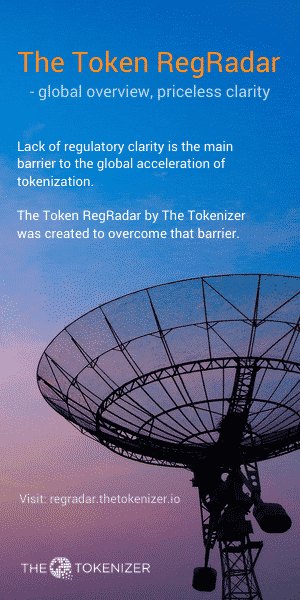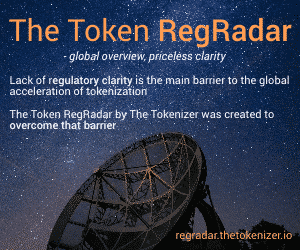Is tokenization set to democratize the global market of investments and open it up for smaller investors to participate in attractive offerings? The answer to that question is not exactly straightforward. In this article, we will discuss why.
Whether it makes sense to claim that tokenization increases the democratisation of investments depends on several factors. It may be right in the sense that when the security token market matures and eventually encompasses a broader range of global security token exchanges, the trading of tokenized assets will be a global event in a global market. And some may like to call a global market more democratic just because it will grow bigger, and because the market depth is likely to increase as a result of this growth.
However, if ‘democratisation’ should imply that anyone – any kind of investor regardless of wealth or geography – would be allowed to participate in any security token offering, this is not likely to be the case in most jurisdictions around the world.
The requirement of being an Accredited or Experienced Investor
In the US the rules are rather strict, meaning that participants must qualify as Accredited Investors to be able to invest freely in the securities market. An accredited investor, in the context of a natural person, includes anyone who:
- earned income that exceeded USD 200,000 (or USD 300,000 together with a spouse) in each of the prior two years, and reasonably expects the same for the current year, OR
- has a net worth over USD 1 million, either alone or together with a spouse (excluding the value of the person’s primary residence).[1]
In Europe, the counterpart to the Accredited Investor is called an Experienced Investor[2], and according to the Markets in Financial Instruments Directive 2004/39/EC – also known as MiFID – an Experienced Investor must satisfy at least two of the following quantitative criteria regarding expertise, experience and knowledge:
- The client [aka the investor] has carried out trade transactions, in significant size (at least EUR 50,000), on the relevant market at an average frequency of 10 per quarter over the previous four quarters;
- the size of the client’s financial instrument portfolio, defined as including cash deposits and financial instruments, exceeds EUR 500,000;
- the client works or has worked in the financial sector for at least one year in a professional position which requires knowledge of the transactions or services envisaged.[3]
The apparent justification of these restrictions is to protect small retail investors against themselves in case they invest in something without understanding the consequences and lose more money than they can afford. Whilst appearing to protect in practice, the flip side is that it only allows the wealthiest few percent of a population to get a part of the action in the most attractive investment opportunities. It is also clear that a system which excludes smaller retail investors from the rich boys’ club must be suspected of being designed more to protect the already wealthy than the ordinary people.
Strict US investment laws exclude the majority of Americans
When talking about security token offerings in the US, at least 93% of the American population are excluded because of their inability to fulfil the requirements as accredited investors. However, the law does have certain exemptions such as Regulation A[4] (Reg A) which – at least in theory – could be relevant here. Reg A allows non-accredited investors to be included in a security offering, but the problem is that in practice Reg A is known for being quite demanding, time-consuming and expensive – and not a realistic option for start-ups, which so far constitute the majority of companies wishing to issue security tokens.
That said, it may be argued that even if all legal restrictions were eliminated, the market itself would still not become anymore democratic. The market, by nature, will probably always have its entry barriers that efficiently exclude the majority of a population no matter what. Even if people are legally allowed to invest one million dollars in a real estate project, they still need to be able to come up with the money. So, what difference does it make in practice if investors must be accredited or not?
Well, one of the beautiful points of tokenization is precisely that this new way of fundraising, via tokens issued through a smart contract on a blockchain, allows for fractional ownership, which means that the investors do not necessarily have to lay down a considerable sum to buy into, for instance, a real estate project.
It would make a difference in such cases if investors did not have to be accredited to participate, and consequently, the strict regulations do seem to be a real barrier for a further boost of tokenization in the US. Even if somebody only wants to invest a relatively small amount, they still need to be an accredited investor, unless the issuer of the tokens is filing for a Reg A, which is an unlikely scenario.
In conclusion, opening up for broader participation of small investors is probably not going to happen anytime soon in the US. So far, in the land of opportunity, investing in security tokens is likely to stay as a game strictly for accredited investors, whereas the picture might be slightly different in Europe[5].
A European opening
Even though the US has undoubtedly been the main driving force so far within the development of security tokens and tokenization, Europe and the European Economic Area (EEA) seems to be in front when it comes to opening up the securities market for a more diverse group of investors.
A new Prospectus Regulation (EU) 2017/1129 of the European Parliament and of the Council of the 14th of June 2017 takes centre stage here, although it was not of course developed with any regard to tokenization or the new market of security tokens. Within the EU law, a regulation is a legal act that applies “automatically and uniformly to all EU countries as soon as they enter into force, without needing to be transposed into national law.”[6] Regulations are binding in their entirety in all EU countries, and two sections from the introductory remarks of the regulation are essential in this context:
(12) For offers of securities to the public with a total consideration in the Union of less than EUR 1 000 000, the cost of producing a prospectus in accordance with this Regulation is likely to be disproportionate to the envisaged proceeds of the offer. It is therefore appropriate that the obligation to draw up a prospectus under this Regulation should not apply to offers of such small scale. Member States should not extend the obligation to draw up a prospectus in accordance with this Regulation to offers of securities to the public with a total consideration below that threshold. However, Member States should be able to require other disclosure requirements at national level to the extent that such requirements do not constitute a disproportionate or unnecessary burden in relation to such offers of securities.
(13) Furthermore, in view of the varying sizes of financial markets across the Union, it is appropriate to give Member States the option of exempting offers of securities to the public not exceeding EUR 8 000 000 from the obligation to publish a prospectus as provided for in this Regulation. In particular, Member States should be free to set out in their national law a threshold between EUR 1 000 000 and EUR 8 000 000, expressed as the total consideration of the offer in the Union over a period of 12 months, below which the exemption should apply taking into account the level of domestic investor protection they deem to be appropriate. However, such exempted offers of securities to the public should not benefit from the passporting regime under this Regulation. Below that threshold, Member States should be able to require other disclosure requirements at national level to the extent that such requirements do not constitute a disproportionate or unnecessary burden in relation to such exempted offers of securities. Nothing in this Regulation should prevent those Member States from introducing rules at national level which allow the operators of multilateral trading facilities (MTFs) to determine the content of the admission document which an issuer is required to produce upon initial admission to trading of its securities or the modalities of its review.[7]
What these openings and exemptions mean in practice for the development of the European tokenization and security token market going forward is something that we will write a lot more about in The Tokenizer. The first European security token issuance platforms are already offering investment projects that include non-accredited/non-experienced investors to participate. The company Neufund operating out of Berlin is at the forefront of this, and we encourage you to read more in our interview with Neufund’s CEO, Zoe Adamovicz, and Legal Architect, André Eggert, here.
[1] https://www.investor.gov/additional-resources/news-alerts/alerts-bulletins/updated-investor-bulletin-accredited-investors
[2] https://www.prospectus.com/private-placement-memorandum-services-information/experienced-investors/
[3] https://eur-lex.europa.eu/LexUriServ/LexUriServ.do?uri=CELEX:32004L0039:EN:HTML
[4] https://www.sec.gov/smallbusiness/exemptofferings/rega
[5] In this article, we will take the liberty only to compare the US and Europe.
[6] https://ec.europa.eu/info/law/law-making-process/types-eu-law_en
[7] https://eur-lex.europa.eu/legal-content/EN/TXT/?uri=CELEX%3A32017R1129
More Article:
You Might also Like















